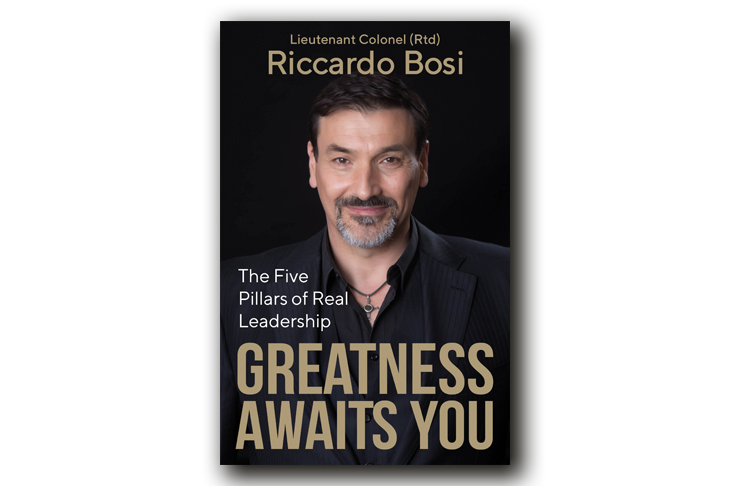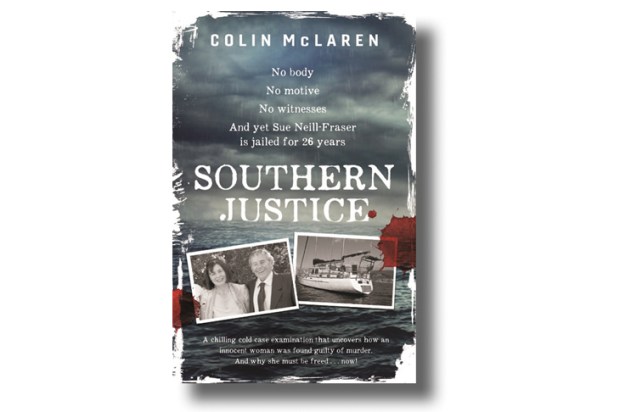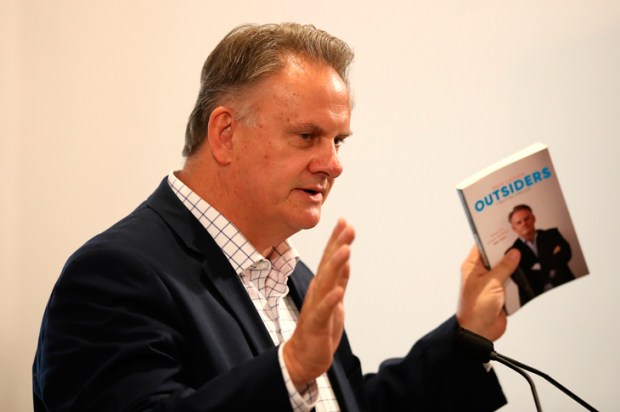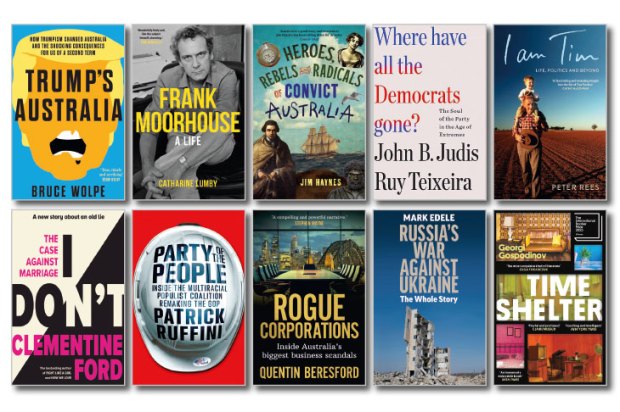Having fired off his first challenge in paragraph one (‘Read every word of this book, but don’t believe a word of it.’), Riccardo Bosi invites the reader to take up plenty of challenges, all in the interest of forging the quality of leadership that is defined by words Bosi quotes from a Regimental Sergeant Major, of the Royal Australian Regiment, Warrant Officer Class One, Michael Hill: ‘The measure of a leader is not how many you lead, but how many will follow.’
God. Trump. Rockefeller. The Declaration of Independence… and it’s still just page 6. The texture and depth of the book is already evident, already beckoning the reader to follow.
Bosi served for 24 years in the Australian Army, including time in the Special Air Service (SAS). He is now hoping to serve as a NSW Senator, running in the 2019 election. Not surprisingly, he is still very clearly a military man, from his ramrod bearing, smart, clean grooming and firm handshake to his business card — Lionheart Australasia, his consulting firm, with clients ranging from corporates to government, subjects from security to leadership. (Amongst other things, he led the training of UAE Special Forces soldiers to fight the ‘War on Terror’ and deployed with them to Afghanistan in 2012.)
He’s a tough guy, alright; for three years he was principal carer for his family (three children) while his wife Rhiannon underwent chemotherapy for multiple sclerosis. He writes with the confidence he wishes to impart to his readers. To followers who wish to be leaders. It’s not literature, though, more like a training manual (with blank pages for your notes) propelled by encouragement. You could call it a self-help book, but one aimed at those with an elevated ambition: Greatness 101, perhaps.
Bosi sets out one of the key markers of real leadership early in the book: a real leader is one who, using nothing but what they are, unites many to achieve good. In other words, it’s a matter of character and personality. He wrote the book because he feels the one thing Australia lacks is leadership. He wants to empower individuals to create better communities, companies and eventually a better country.
The book is set out in six chapters, starting with 0, The Foundation — Trust, followed by Chapter 1: The First Pillar, which is indeed about Your Character. This is followed by the other four chapters, Your Capability, Your Invention, Their Empowerment and finally — You.
Bosi’s exemplary leaders are a mixed bunch, ranging from Benjamin Franklin to the mixed race Frederick Douglass, born into slavery, going on to become the first African American to receive a vote to be nominated for US President, at the 1888 Republican Convention; Booker T. Washington, also born into slavery and also rose to prominence, not least as advisor to Presidents; and on to Walt Disney, among others.
All that is covered in the Prologue, so by the time the reader starts Chapter 0 — Trust, the tone is set: aspire, work, seek.
And ‘Be Measured’, writes Bosi, train to control your emotions and rely on reason. He talks about knowing what is the ‘end state’ — the ultimate objective, so you can determine the best course of action. In a siege situation, he cites, what is the end state, the mission of the security forces? To kill the terrorists or to save the hostages. They are very different and the mission will be decided by the end state desired.
In many ways, much of what Bosi formulates springs from common sense and is easily understood. They are simple concepts, though not at all simplistic. He constructs the elements to guide the reader through the idea that underpins his message — how to build character traits into a leadership profile.
It occurs to me while reading this book that the practical ways in which Bosi sets out the ideals that forge leadership makeit highly suitable not just for aspirational adults but also for high school-age children; old enough to understand the concepts, young and impressionable enough to absorb, digest and apply those concepts — for their own good and for the greater good of their society: consistency, loyalty, trustworthiness. It is these very same principles that distinguish leaders, that distinguish decent, positive human beings.
Sprinkled throughout is a moral, even spiritual, underpinning to Bosi’s philosophy. It is the Judaeo-Christian principles of Western Civilisation that ground and inform his approach to each of the key elements of the human condition. Plato and Aristotle make appearances, too. So does the soul.
Those in your organisation whom you wish to lead need to be shown greatness, says Bosi. They expect you to lead from the front by example; show them how to be and show them how to win. And ‘if you don’t know what “Greatness” looks and feels like, you’re in a bit of trouble,’ he says. But don’t despair: start by studying the ‘Greats’ throughout history; they’ve all faced problems and solved them. Then start acting ‘Great’. He doesn’t say this, but that’s not to be confused with being big-headed.
For the average reader, the presentation of much wisdom acquired by humanity over the centuries in nugget-sized pieces is appealing. To those who wish to use it is a manual to enhance their character, their potential for ‘greatness’ as leaders in organisations of any kind — and their humility along the way — it is both economically written and accessible. It is also authentic, based on lived experience.
The world needs ‘Real Leaders’ more than ever, he says before signing off, but they must know what is the ‘end state’ — where they are going.
Got something to add? Join the discussion and comment below.
Get 10 issues for just $10
Subscribe to The Spectator Australia today for the next 10 magazine issues, plus full online access, for just $10.
You might disagree with half of it, but you’ll enjoy reading all of it. Try your first month for free, then just $2 a week for the remainder of your first year.














Comments
Don't miss out
Join the conversation with other Spectator Australia readers. Subscribe to leave a comment.
SUBSCRIBEAlready a subscriber? Log in